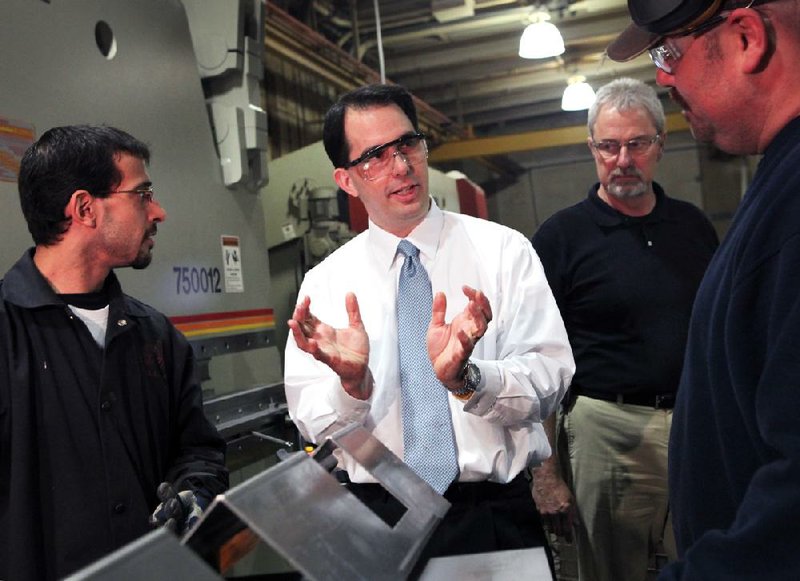LITTLE ROCK — Wisconsin Gov. Scott Walker will become the first governor in the state’s history to face a recall election, a state board ruled Friday after finding that critics had collected more than enough signatures to force a vote.
The Government Accountability Board voted unanimously to approve the election after finding that 900,938 state residents had signed petitions demanding the recall. Under state law, far fewer signatures were needed — 540,208, or 25 percent of the total votes cast in the last governor’s election.
Walker, a Republican elected to his first term in 2010, had been the topic of recall demands since shortly after he took office and pushed for sharp cuts in benefits and collective bargaining rights for most state workers. Only two U.S. governors have been removed by recall: Gray Davis of California, in 2003, and Lynn Frazier of North Dakota, in 1921.
The primaries were set for May 8, and the general election was scheduled for June 5.
“We have long said that we anticipated the election process would move forward,” Ciara Matthews, a spokesman for Walker’s campaign office, said in a statement after the board’s decision. “Now it is time for voters to examine the choice they will be faced with in June. We believe a majority of Wisconsin voters will stand with Gov. Walker’s record of laying the foundation for a more successful Wisconsin while moving the state forward and against the Democrats’ failed policies that would take Wisconsin back to the days of a $3.6-billion budget deficit.”
Matthews’ statement continued: “Voters are not prepared to reverse the tremendous progress the governor has made by prematurely ending his term in this $9 million power grab by out-of-state special interests.” Months ago, state elections officials said a recall election would probably cost Wisconsin at least $9 million. Walker’s chief critics — labor supporters, Democrats and others — had devoted loads of attention to gathering signatures and taking the recall to the ballot. (About 30,000 signatures were removed from consideration because of technical problems such as missing dates and addresses, fictitious names or duplications, the accountability board said, but that still left hundreds of thousands of signatures above the requirement.)
The focus now turns to a more complicated matter: The actual election — and Democrats have yet to put their efforts behind one candidate.
Under Wisconsin law, there is little time.
Late Friday, Mayor Tom Barrett of Milwaukee, the Democrat who ran unsuccessfully against Walker two years ago, told supporters he will seek the office once again.
Other Democrats already in the race for the primary in less than six weeks include Kathleen Falk, a former Dane County executive; Doug La Follette, the secretary of state; and state Sen. Kathleen Vinehout.
In addition to Walker, accountability board members approved recall elections on the same dates for Lt. Gov. Rebecca Kleefisch, a Republican, and four Republican state senators (one of whom recently resigned).
Democrats pushed for the recalls to shift the balance of power in Madison, the capital, where Republicans took over both chambers of the Legislature and the governor’s office in the 2010 election. The Republican state senator’s resignation put the balance in that chamber temporarily at 16-16, and both sides hope to take control.
Even before the election became official Friday, fundraising efforts and advertising had kicked into high gear across the state. State regulations allowed Walker to raise unlimited funds until the accountability board certified the election, and he has been raising millions — more than any other candidate for governor in the state’s history — for months, some of it in other states. Now, Walker will be limited to raising a maximum of $10,000 from an individual donor, just as his competitors will be.
Complicating matters, Wisconsin residents are already weary from a series of divisive campaign seasons, including efforts last summer to recall state senators in both parties and a nominally nonpartisan race for the state Supreme Court last year.
In a way, the state’s presidential primary Tuesday has become an afterthought for voters, many in the state say.
Meanwhile, a Wisconsin law requiring most of the state’s public employee unions to recertify annually has been struck down by a federal judge in Madison.
U.S. District Judge William Conley on Friday said the rule violates constitutional guarantees of equal protection because it creates an unsupportable distinction between “general employee” unions that are required to comply and “public safety” unions, which are exempt.
He also invalidated a part of Wisconsin Act 10, signed by Walker last year, which prohibited the voluntary deduction of union dues from the paychecks of general employees only. The judge declined to strike down the bulk of the law curbing public employee collectivebargaining rights.
Information for this article was contributed by Andrew Harris and Marie Rohde of Bloomberg News.
Front Section, Pages 4 on 03/31/2012
